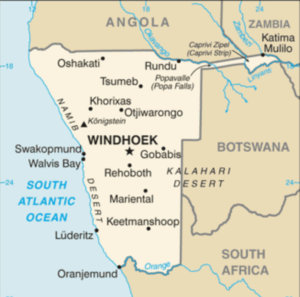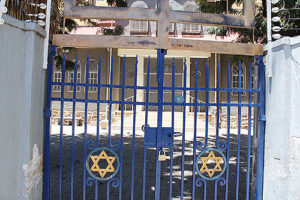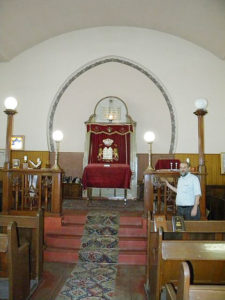 Namibia has been home to Jews since the mid-1800s. In 1861, Jewish businessmen from Cape Town in South Africa established a trading post along Namibia’s coast, and helped build the region’s copper mining industry. Windhoek is the capital city.
Namibia has been home to Jews since the mid-1800s. In 1861, Jewish businessmen from Cape Town in South Africa established a trading post along Namibia’s coast, and helped build the region’s copper mining industry. Windhoek is the capital city.
After Namibia became a German colony in 1884, a number of German Jews helped build up the country: Carl Fuerstenberg, a Jewish banker, helped finance railroads; Emil Rathenau helped form the German South West African Mining Syndicate and funded irrigation projects.
 During the middle of the 19th century the De Pass brothers, Jewish merchants from Cape Town, established a trading post on the Nawaqualand Coast, becoming the first Jews in this southwest African area. In 1861, they started the Pomona Copper Company.
During the middle of the 19th century the De Pass brothers, Jewish merchants from Cape Town, established a trading post on the Nawaqualand Coast, becoming the first Jews in this southwest African area. In 1861, they started the Pomona Copper Company.
 In 1917, about 20 Jewish families founded the Windhoek Hebrew Congregation in Windhoek, Namibia’s capital; eight years later, they built a synagogue. In 1927, a second synagogue was built in the town of Keetmanshoop.
In 1917, about 20 Jewish families founded the Windhoek Hebrew Congregation in Windhoek, Namibia’s capital; eight years later, they built a synagogue. In 1927, a second synagogue was built in the town of Keetmanshoop.
After South Africa was granted a mandate over Namibia by the League of Nations after World War I, the Jewish population increased and, by 1965, there were 400-500 Jews, most living in Windhoek.
By the late 1970s, 1,280 Jewish families called Namibia home. Five synagogues operated in Namibia. Today, only about 90 Jews call Namibia home and the last remaining synagogue, in Windhoek, struggles to make a minyan.